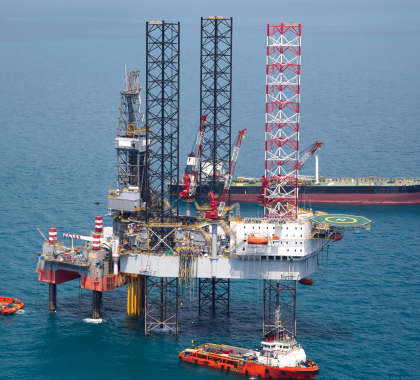California government officials declared they will block President Donald Trump’s plan to include a portion of the outer continental shelf (OCS) off the state’s coast in his proposal to expand offshore oil and gas exploration and production.
California’s declaration comes in the wake of the U.S. Department of Interior’s (DOI) January 4 announcement it plans to open up vast areas of the Atlantic and Pacific Oceans, Gulf of Mexico, and some coastal areas of Alaska to new oil and gas exploration and development.
Energy Dominance Agenda
Trump’s OCS proposal is another step in his effort to expand domestic energy production in his quest for American “energy dominance.” Trump signed an executive order in April 2017 directing the DOI to reconsider a five-year offshore drilling ban former President Barack Obama imposed in the waning days of his administration.
During the April 4 signing ceremony, Trump said Obama’s plan was bad for the U.S. economy and was preventing the creation of thousands of jobs.
“[Obama’s plan] deprives our country of potentially thousands and thousands of jobs and billions of dollars in wealth,” said Trump during the signing ceremony. “Renewed offshore energy production will reduce the cost of energy, create countless new jobs, and make America more secure and far more energy-independent.”
Having reconsidered Obama’s ban, in January DOI proposed offering 47 possible drilling sites for auction, including seven areas in the Pacific Ocean off California’s coast, which has been off-limits to new exploration and production since 1969.
Blocking Land Transport
California government officials condemned the Interior Department’s plan and are taking steps to thwart the administration’s proposal to allow drilling in the OCS adjacent to the state.
In early February, the powerful State Lands Commission said it will refuse to issue permits for drillers to bring oil or natural gas from offshore fields to land.
“It is certain that the state would not approve new pipelines or allow use of existing pipelines to transport oil from new leases onshore,” the commission wrote in a letter.
“I am resolved that not a single drop from Trump’s new oil plan ever makes landfall in California, where our leadership in reducing emissions and curbing pollution has enabled exceptional economic growth,” Lt. Gov. Gavin Newsom, chairman of the three-member State Lands Commission and a Democratic candidate to be the party’s nominee for governor, said in a statement.
The California Coastal Commission, which has authority to review oil and gas activity off the state’s coast, announced it was also opposed to new offshore oil and gas production in the Pacific Ocean.
Deliberately Driving Up Costs
Shortly after the Interior Department’s OCS expansion plan was announced, several other states’ governors announced opposition to expanded drilling off their coasts. Media reports indicate those states may take California’s attempts to block pipelines from shipping any newly produced oil and gas to shore as a blueprint for their own efforts to halt the plan.
Without pipeline infrastructure, energy companies would have to rely on an expensive alternative used in deep-water drilling, which involves pumping hydrocarbons into giant floating storage stations and loading the oil onto ships to be transported to market. This would add to the costs of offshore production, making new leases less appealing at current oil prices.
‘Bad for Their Coastlines’
John Goodman, president of the Goodman Institute for Public Policy Research, says state efforts to block new offshore oil production are bad for the environment because research shows pipelines are the safest way to transport oil and natural gas.
“States’ efforts to block new offshore oil and gas production are bad for their economies and potentially bad for their coastlines as well,” said Goodman. “By blocking pipelines from bringing oil and gas to shore, states may delay new leases, but when prices for oil and gas rise high enough, new production will ensue, and it will be transported through ships to ports with appropriate infrastructure.
“Studies show pipelines are by far the safest way to transport oil and gas; thus states blocking pipelines will be placing their beaches at increased risk as well as foregoing the high-paying infrastructure and oil and gas jobs that would accompany the new production and pipelines,” Goodman said.
Multiple Ways to Delay
Another tool California and other states may use to try to block or delay OCS is the 1969 federal Coastal Zoning Management Act.
The law gives states authority to review offshore oil and gas exploration, development, and production plans. Every coastal state in the continental United States has a federally approved coastal management plan allowing it to review whether federal offshore lease sales are compatible with those plans.
In addition, on March 5 a group of 22 Senate Democrats, led by Maria Cantwell (D-WA), sent a letter to Interior Secretary Ryan Zinke requesting DOI extend its 60-day public comment period and hold additional field hearings to gather feedback from affected coastal states.
Emulating Germany
Craig Rucker, executive director of the Committee for a Constructive Tomorrow, says Germany’s energy problems show California’s rejection of cheap energy could be disastrous for the state.
“This is further proof, as if such were needed, of California’s hostility to affordable and reliable energy,” said Rucker. “The state is staking its future on wind and solar energy, having learned nothing from Germany’s disastrous reliance on renewable energy, which has ironically forced the country to import more U.S. coal to supply it with the electricity it needs.”
Bonner R. Cohen, Ph.D. ([email protected]) is a senior fellow at the National Center for Public Policy Research.





